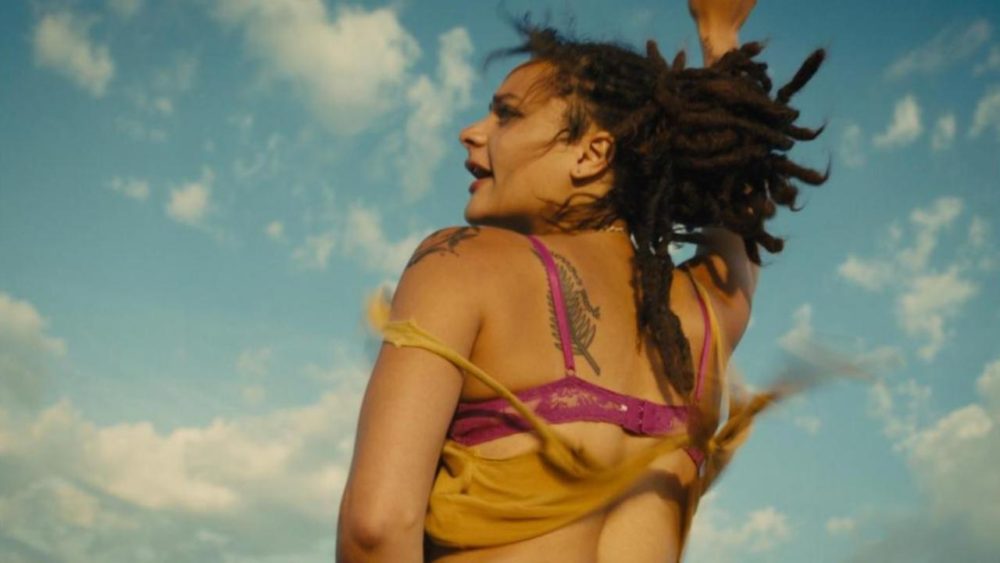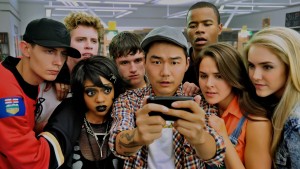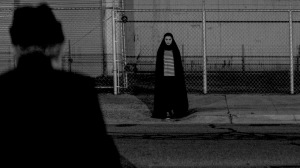
Once upon a time, I met director Andrea Arnold. She walked into the lobby of the Standard Spa, Miami Beach, hours late while I was working for the Miami International Film Festival for the first time in my life as part of an internship. To be noted: I was a nervous wreck because I was meeting a woman who made three films I loved; Red Road (which I reviewed as a 21 year old baby a month or so before meeting her), Fish Tank (which I grew to love upon second viewing after a mixed initial reaction), and Wuthering Heights (which is easily the best adaptation of a Brontë novel to exist outside of Kate Bush’s music video).
My job for the festival was to escort filmmakers to their screenings and, sometimes, to dinner or drinks. Sometimes we’d make small talk and enjoy the conversation and sometimes I’d sit there awkwardly in the car being quiet with the drivers after getting asked to turn the music down. Arnold was, well, different. I’ve done dozens of interviews since this point in time and never have I felt as comfortable as I did the moment Arnold and I began to talk. She tossed off her cowboy hat, something she’d been wearing on her road trip through America to make it to Miami, and showed me videos of what she spent a good portion of her evening in northern Florida doing: line-dancing.
This was… not something easy for me to digest. Red Road, Fish Tank, and Wuthering Heights, while incredibly aware of exactly how each character would live and interact with their respective universes, were all pretty downbeat movies. And here was this amazing woman telling me stories of going out to the middle of nowhere in Florida and getting taught to line-dance late at night before hopping in the car and starting a sing-along with the driver and myself to Marvin Gaye’s “Sexual Healing.” What the fuck was going on and where was this Twilight Zone episode going to take me?
It took me to the Tower Theater, where Arnold immediately made her presence known, not as a filmmaker, but as an outsider. Every person standing in line gave her the strangest looks as she paced and chatted with people. As she checked her email, she asked me if I could play her a song someone sent her: Kylie Minogue’s “Can’t Get You Out of My Head.” I whipped out my headphones, handed ‘em over, and happily let her take my phone with it. And then she danced. Right there in front of me. She stuck one of the buds in my ear and made me dance with her, something anyone who knows me knows I’d be horrified of doing, but it was natural in the moment. We took the song to the speakers of the Tower, begging the theater manager as the filmmaker wanted it to happen, and it happened. And she danced, not just with me, but with unsuspecting bystanders waiting for Wuthering Heights to start, and they smiled and laughed and were entirely caught up in Arnold’s infectious mood.
Of course, the surprise in many audience members’ eyes when she came up to the front of the theater to say it was her film they were about to watch was hilarious. The surprises kept coming for me too as our dinner conversation (accompanied by two other people who I admittedly can’t remember) bounced as quickly between levity and seriousness as her films sometimes do, though conversation about her films was quickly set aside for more important topics: a little about the festival, a lot about the things she’d seen in her travels while researching for her upcoming film set in the US, and the concept of manufactured happiness and what happiness meant to some people and what kind of dreams lead to said happiness. It was a moment in the conversation that always felt strange to me, but left me thinking to myself about my own happiness for the rest of the night, which continued with a great Q&A session and some chatting about whether she’d party a bit at the festival or relax in the giant tubs at the Standard that she was just as excited about as I was.
We parted ways that night and she told me not to tell people what she’d told me, and some others, about her film. I promised I wouldn’t and I meant it. And I never did, though a minor description of road tripping across America did end up getting around rather quickly without much detail thankfully. I thanked her and thought I would get her email from someone else who had since she told me to do that, but I never did. I regret that a lot, but that’s neither here nor there.
It’s been four years and a half years since this occasion and it’s been just a few hours since I’ve seen American Honey. To call it strange for me is an understatement. Watching American Honey was like meeting Andrea Arnold all over again, resulting in an emotional experience I never really expected from it. Here was Star, played by the utterly compelling Sasha Lane, getting caught up in the whirlwind that was these brash and amazing people she looked up to in a strange way. Arnold paints her characters like she’s known them for years, making all of them instantly familiar. She invites the willing audience member along for the ride in getting to know this family, with even the most minor characterization coming across naturally instead of as a random fact about them.
One guy whips his dick out a lot and the others punch him for it. One guy has a flying squirrel. One straight pair finds a dog and discusses whether or not they should get the dog high. One gay pair kisses quietly against a car and cuddle together while sleeping. One girl makes the gang switch to rock music every so often once she gets tired of the rap. One girl quietly loves Darth Vader and Star Wars with a restrained passion that no modern fandom member who stakes his spot in line and knows every quote back to back will ever understand. The list goes on and on, though they are all one in the moments that matter, be it sleeping in cheap motel rooms or dancing to Rihanna and Calvin Harris’ “We Found Love” in a superstore.
Arnold packs her film with scenes of these young adults crammed into a car together, her intimate aesthetic creating a kinship between viewer and character that doesn’t always exist in films like this. The 4:3 framing and the dedication to finding texture in everything (you can practically smell the sweat on characters like Shia LaBeouf’s If a comparison to another filmmaker is to be made, it’s Harmony Korine, as loath as I am to admit it. The praises and criticisms of his work, particularly that of Gummo, mirror what is being said of American Honey in a morbidly fascinating way. There’s a particular fondness for impoverished Americana, presented with a complete sincerely that many people claim Korine himself shared in the way he filmed his characters back in the day.
Sure, Arnold gazes a little too long over certain things—and the film will undoubtedly be critiqued for its indulgences and length—but there’s a feeling that the filmmaker actually spent time with these people and felt no contempt for them. This is, of course, a biased opinion, something I’ve come to realize is heavily fueled by the fact that I saw her personally interact with and smoothly get to know a multitude of people over the hours spent with her. Better yet, American Honey moves along at just the right pace and gives you just the enough of these so-called “misfits” that you desperately want to spend more time with them, even if you didn’t quite care about them when you interacted with similar people in real life. She repeats beats at times, yes, particularly that of Star getting herself into seemingly dangerous situations and always coming out alright, but the length never feels like a damnation once you’re comfortably attuned to said beats.
Most importantly, Arnold never exploits the world that these people live in, blurring the line between bits of fiction and non-fiction in the best of ways and making each character feel like someone you’ve probably met in real life. Even the casual criticisms of certain figures (rich married men who want to drink with a young, seemingly naive women; a particularly religious mother who catches her daughter sexily dancing to Ciara’s “Ride” in front of a strange young man; having Riley Keough’s magazine ringleader Krystal wear a confederate flag bikini in front of Star while LaBeouf’s Jake slathers body lotion on her legs), villainy is never attributed to any human being and Arnold avoids a mean-spirited streak that many modern filmmakers who tackle characters like this go straight for. She doesn’t aim her camera at the impoverished areas visited in the film in order to give the world more docu-style poverty porn; she’s simply telling a story about a particular set of kids who messily find their way to a family of their own, even if it doesn’t seem idyllic.
This sprawling narrative, of kids selling magazine subscriptions in an era when magazines have been more or less left for dead in order to just live day to day traveling the country, unsurprisingly lends itself to heavy handedness—discussing dreams and aspirations while Bruce Springsteen’s “Dream Baby Dream” plays being just as on-the-nose and effective as anything Korine does in Spring Breakers—but it’s easy to excuse when the journey is so enjoyable and impeccably crafted to feel natural and off-the-cuff, so much so that few male orgasms will ever feel as genuine as when Shia LaBeouf cums for the first time. The formal and thematic beats of Andrea Arnold’s career (and this includes her work on Jill Soloway’s Transparent which trades in common themes of isolation and finding comfort in the unfamiliar) are ever-present here, but American Honey is a work of art brimming with optimism and a sense that everything is going to be alright for the “degenerate” millennials who have been told time and time again that their actions only result in negative consequence.
As the characters sat in a car together toward the end of the film, many of them singing along to Lady Antebellum’s “American Honey,” I found myself singing along too, just as I had with Arnold in the car on that first meeting. It was nostalgic, it was familiar, it was an encouragement to go out there and find out what life had to offer, it was everything that Star wanted out of this makeshift family, and I was being invited in to enjoy the ride and follow in those footsteps in the same way I had been invited to so long ago, despite my overwhelming shyness and hesitation. Riding home and sitting here now, those lyrics to the titular song feel all the more powerful and I’m all the more thankful for my unforgettable experience with Andrea Arnold and with the film I’d comfortably call her masterpiece.
“There’s a wild, wild whisper blowin’ in the wind, callin’ out my name like a long lost friend. Oh I miss those days as the years go by. Oh nothing’s sweeter than summertime and American Honey.”
—
Directed by Andrea Arnold; written by Andrea Arnold; starring Sasha Lane, Shia LaBeouf, Arielle Holmes, Riley Keough, and McCaul Lombardi; 163 minutes.
American Honey is currently experiencing a limited theatrical release. It opens in Miami on October 21st.



 Derek
Derek
 Isabelle
Isabelle